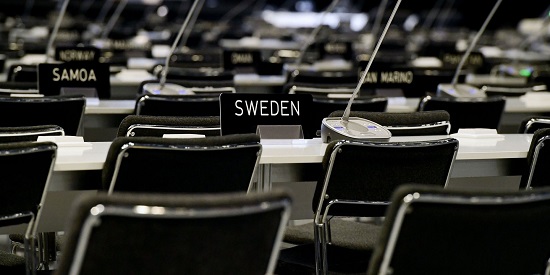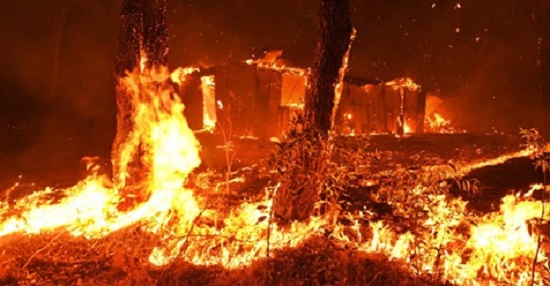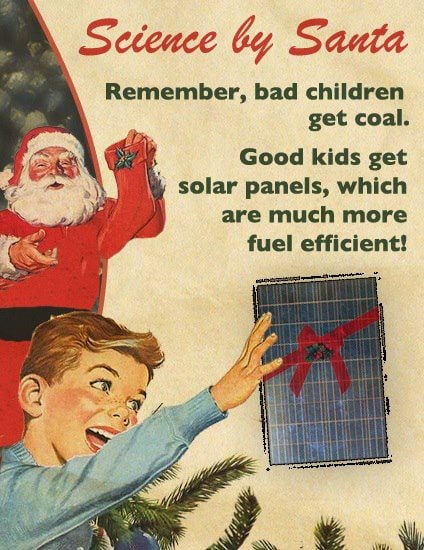2019 SkS Weekly Climate Change & Global Warming Digest #51
Posted on 22 December 2019 by John Hartz
Story of the Week... Editorial of the Week... Toon of the Week... Coming Soon on SkS... Climate Feedback Claim Reviews... SkS Week in Review... Poster of the Week...
Story of the Week...
Rich Nations, After Driving Climate Disaster, Block All Progress At U.N. Talks

Empty chairs of the delegations are pictured during the U.N. Climate Change Conference COP25 in Madrid, on Dec. 13, 2019. Photo: Cristina Quicler/AFP/Getty Images
LAST WEDNESDAY, over 300 demonstrators at COP25 in Madrid — this year’s 14-day U.N. climate talks, the group’s longest ever — watched from the courtyard of a conference center as a metal wall rose up seemingly out of nowhere, locking civil society observers literally out in the cold. Moments earlier, some had had their entry badges snatched off them by U.N. guards in skirmishes outside the main plenary hall before they were cordoned off. Security prevented them from speaking even to the press; all civil society observers had been barred from entering the conference center. With access to the venue now blocked, protesters marched out the back entrance, where they were greeted by Spanish police.
The protest was intended to call out the widespread lack of ambition coming from some of the world’s biggest emitters of heat-trapping greenhouse gasses, calling on countries in the “global north” to provide support for climate mitigation, adaptation, and recovery, plus excise loopholes that would give polluters a way out to keep on with business as usual. Demonstrators’ credentials were restored a few hours later, but the talks had done little to address their concerns. By Saturday afternoon — two days after talks were set to end — there was little agreement as to what would come out of them. “There is no one issue that is completely resolved,” Harjeet Singh, who leads up global climate work for ActionAid, told me. By the end of the closing plenary the next day, most major issues had been punted to future meetings. Even U.N. Secretary General António Guterres expressed his dissatisfaction on Twitter.
“There is no doubt: rich countries have been blocking progress across the board,” Singh said.
Rich Nations, After Driving Climate Disaster, Block All Progress At U.N. Talks by Kate Aronoff, The Intercept, Dec 18, 2019
Editorial of the Week...
How much closer to their doors must the fire burn? It's immoral not to connect the dots

Connecting the dots ... the carbon we burn makes it hotter, and exposes us to more fire. Credit: Nick Moir
"Our Prime Minister has a moral obligation to protect the citizens who elected him, and those who didn’t. He should play a constructive role in the ongoing climate negotiations, and so help with that task of emissions reduction. Were he to do so, Australia’s actions could help inspire the world to cut emissions hard and fast.
"Nobody can now deny the reality of climate change. We’ve all seen, felt and breathed it. And we know that the conditions that we and our children face in the future are likely to be far more severe than those experienced this summer.
"Catastrophic conditions should not be the norm. The politicians and polluting industries that remain unwilling to assist with the urgent task of reducing greenhouse gas pollution must be held to account for lives lost and environments devastated. How much closer to their doorstep does the fire have to burn?"
How much closer to their doors must the fire burn? It's immoral not to connect the dots, Opinion by Tim Flannery, Sydney Morning Herald, Dec 20, 2019
Click here to access the entire opinion piece as posted on the Sydney Morning Herald website.
Toon of the Week...

Hat tip to the Stop Climate Science Denial Facebook page.
Coming Soon on SkS...
- The high and low points for climate change in 2019 (Bud Ward)
- The five corrupt pillars of climate change denial (Mark Maslin)
- Skeptical Science New Research for Week # 51 (Doug Bostrom)
- What psychotherapy can do for the climate and biodiversity crises (Caroline Hickman)
- 2019 SkS Weekly Climate Change & Global Warming News Roundup #52 (John Hartz)
- 2019 SkS Weekly Climate Change & Global Warming Digest #52 (John Hartz)
Climate Feedback Claim Reviews...
- Ice cube meme misrepresents physics of sea level rise to claim melting ice has no effect, Edited by Scott Johnson, Claim Reviews, Climate Feedback, Dec 17, 2019
Poster of the Week...

Hat tip to the Stop Climate Science Denial Facebook page.
SkS Week in Review...
- 2019 SkS Weekly Climate Change & Global Warming News Roundup #51 by John Hartz (SkS Original)
- Scientists plan year locked in ice to unlock Arctic climate change data by Kristen Pope (Yale Climate Connections Repost)
- Skeptical Science New Research for Week #50, 2019 by Doug Bostrom (SkS Original)
- SkS Analogy 21 - Snow on a Hot Tin Roof by Evan & jg (SkS Original)
- COP25: Key outcomes agreed at the UN climate talks in Madrid by Simon Evans & Josh Gabbatiss (Carbon Brief Repost)
- 2019 SkS Weekly Climate Change & Global Warming Digest #50 by John Hartz (SkS Original)































 Arguments
Arguments






























I appreciate Pete Ogden's optimism. The future of humanity benefits from, and requires, speedier corrections of harmful unsustainable developments. It will also benefit from speedier development of new and improved sustainable ways of living.
I also understand his concerns. Undeserving powerful people have proven that they can drum up support to resist the expansion of awareness and improvement of understanding required to increase support for achieving the required changes.
I hope that expanding awareness and improved understanding of climate science and the required corrections of what has developed will more rapidly overcome the efforts to discredit climate science, efforts to deny that the required corrections are required.
Competitions for impressions of status clearly require governing. Increased freedom for people to believe whatever they want as the basis for doing whatever they develop a liking for has failed to produce the required sustainable developments in a timely manner. Even a focus on popularity and profit has failed to help. In fact, focusing on popularity and profit as measures of acceptability and success is undeniably a major part of the problem.
Through the past decades many powerful people succeeded at profiting more than their competitors by getting away with more harmful and less sustainable ways of doing things. They resisted limiting the use of fossil fuels. They even tried to benefit by resisting the rate of transition to less harmful fossil fuels. And they still compete to win more by being the last wealthy people to be corrected. Many developing 'powerful people' have been learning that lesson.
Getting the harmful reality of that lesson learned is clearly required. Achieving essential objectives like the Sustainable Development Goals will require governing and limiting of the competition. Regrettably, many people cannot be expected to responsibly and helpfully self-govern. It is hard to image that there is still any doubt about that. But misleading marketing by undeserving winners of status is undeniably powerful.
Hopefully the motivated youth will grow in numbers and remain dedicated to pushing for the required corrections. It would be tragic to see the expanded awareness and improved understanding among the youth be over-powered by correction resistant temptations to become more selfish as they age (the Liberal when younger who becomes that type of Conservative as they age).
OPOF: You will also want to read:
We’re Getting a Clearer Picture of the Climate Future — and It’s Not as Bad as It Once Looked by David Wallace-Wells, Intelligencer, New York Magazine, Dec 20, 2019
John Hartz, Thanks for pointing me to that article (and thanks for not pointing out that I failed to note that I started my comment on this string with a reference to the Editor's Choice article in the Weekly News Round Up #51)
As an engineer with an MBA I understand that there has been some limiting of human impacts in spite of the competitive disadvantages that are almost certain to be experienced by the people who lead the corrections (it costs more and is more effort to live and financially benefit more sustainably). But it is important to keep the focus on the harmful resistance to correction, not the optimism that something good is happening in a limited way. A significant portion of the global population being able to resist behaving better will not achieve the required result.
Current day humans are Engineering (application of improved awareness and understanding) the future for humanity with their Business pursuits (maximizing personal benefit and perception of status). In Engineering, harmful resistance to correction cannot be tolerated. In Business (including the business of politics), being harmful gets to be gotten away with for as long as possible. And that harmful personally beneficial attitude can infect Engineering with damaging results.
I do not share the optimistic view of the self-declared alarmist David Wallace-Wells. It is not re-assuring that the worst possible climate change future is less likely. And he actually closes with an example of the callous attitude of more fortunate people that is related to the unacceptability of discussing the 'reduction of the likelihood of the worst case climate future'.
The required limit of total impact to avoid imposing serious climate change consequences on future generations (1.5C maximum) is being Optimistically, and unnecessarily, missed. It is tragically easy to get people who have the ability to behave better to believe it is OK for a higher amount of warming to be imposed on future generations.
Some degree of responsible correction by the most fortunate people is occurring. But the failure of correction by many other more fortunate people is the tragic unacceptable development that attention needs to remain focused on.
On a technical point, I appreciate the purpose of comparing 'expected warming by 2100' for the different RCPs that are evaluated by climate models. However, the maximum warming of the RCP is what really should be compared, not the amount by 2100.
A climate tragedy in the future is not better just because it was created a little further into the future. The more important comparison of the acceptability of the RCPs is their peak level of surface warming and resulting climate change.
Claims that a slower rate of increase would be 'easier to adapt to' also incorrectly Optimistically miss the fact that any adaptation to human induced climate change is a distraction of effort from 'sustainably improving living conditions for humanity'.
As the likes of Greta correctly point out, the future generations will correctly detest the optimism their harm causing predecessors had for the future generation's ability to be collectively wealthier and brilliantly creative in adapting to and solving the harmful changes and challenges imposed on them, changes they have to try to deal with in a future world that is limited by the elimination of resources that used to be available and could have still been available to them in the future.
OPOF: You may want to peruse this blog article and the ongoing discussion it has generated...
The never-ending RCP8.5 debate by And Then There's Physics, Dec 24, 2019